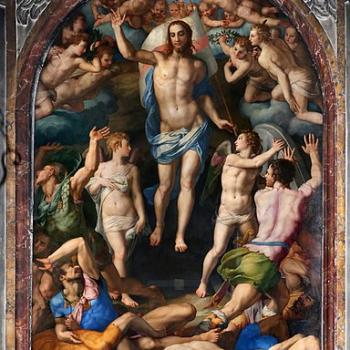
I first ran across former Christian minister and atheist John W. Loftus back in 2006. We dialogued about the problem of evil, and whether God was in time. During that period I also replied to an online version of his deconversion: which (like my arguments about God and time) he didn’t care for at all. I’ve critiqued many atheist deconversion stories, and maintain a very extensive web page about atheism. In 2007 I critiqued his “Outsider Test of Faith” series: to which he gave no response. Loftus’ biggest objection to my critique of his descent into atheism was that I responded to what he called a “brief testimony.” He wrote in December 2006 (his words in blue henceforth):
Deconversion stories are piecemeal. They cannot give a full explanation for why someone left the faith. They only give hints at why they left the faith. It requires writing a whole book about why someone left the faith to understand why they did, and few people do that. I did. If you truly want to critique my deconversion story then critique my book. . . . I challenge you to really critique the one deconversion story that has been published in a book. . . . Do you accept my challenge?
I declined at that time, mainly (but not solely) for the following stated reason:
If you send me your book in an e-file for free, I’d be more than happy to critique it. I won’t buy it, and I refuse to type long portions of it when it is possible to cut-and-paste. That is an important factor since my methodology is Socratic and point-by-point. . . . You railed against that, saying that it was a “handout.” I responded that you could have any of my (14 completed) books in e-book form for free.
Throughout August 2019, I critiqued Dr. David Madison, a prominent contributor to Loftus’ website, Debunking Christianity, no less than 35 times. As of this writing, they remain completely unanswered. I was simply providing (as a courtesy) links to my critiques underneath each article of Dr. Madison’s, till Loftus decided I couldn’t do that (after having claimed that I “hate” atheists and indeed, everyone I disagree with). I replied at length regarding his censorship on his website. Loftus’ explanation for the complete non-reply to my 35 critiques was this: “We know we can respond. It’s just that we don’t have the time to do so. Plus, it’s pretty clear our time would be better spent doing something else than wrestling in the mud with you.” He also claimed that Dr. Madison was “planning to write something about one or more of these links in the near future.” Meanwhile, I discovered that Dr. Madison wrote glowingly about Loftus on 1-23-17:
When the history of Christianity’s demise is written (it will fade eventually away, as do all religions), your name will feature prominently as one who helped bring the world to its senses. Your legacy is secure and is much appreciated.
This was underneath an article where Loftus claimed: “I’ve kicked this dead rodent of the Christian faith into a lifeless blob so many times there is nothing left of it.” I hadn’t realized that Loftus had single-handedly managed to accomplish the stupendous feat of vanquishing the Hideous Beast of Christianity (something the Roman Empire, Muslims, Communists, and many others all miserably failed to do). Loftus waxed humbly and modestly ten days later: “I cannot resist the supposition that my books are among the best. . . . Every one of my books is unique, doing what few other atheist books have done, if any of them.”
These last three cited statements put me “over the edge” and I decided to buy a used copy of his book, Why I Became an Atheist (revised version, 2012, 536 pages) and critique it, as he wanted me to do in 2006. Moreover, on 8-27-07 he made a blanket challenge about the original version of this book: “I challenge someone to try this with my book. I might learn a few things, and that’s always a goal of mine. Pick it up and deal with as many arguments in it that you can. Deal with them all if you can.” His wish is granted (I think he will at length regret it), and this will be my primary project (as a professional apologist) in the coming weeks and probably months.
Despite all his confident bluster, I fully expect him to ignore my critiques. It’s what he’s always done with me (along with endless personal insults). I’m well used to empty (direct) challenges from atheists, based on my experience with Madison and “Bible Basher” Bob Seidensticker, who also has ignored 35 of my critiques (that he requested I do). If Loftus (for a change) decides to actually defend his views, I’m here; always have been. And I won’t flee for the hills, like atheists habitually do, when faced with substantive criticism.
The words of John Loftus will be in blue.
*****
John Loftus’ chapter 1 (pp. 21-36), is entitled, “My Christian Conversion and Deconversion.”
I could only wish that Christian apologists who write their apologetic books would do the same thing. I want to know what personal experiences they have had and how they interpret them so that I can be able to judge why they believe the things that they do. But they don’t generally do this at all. (p. 21)
Once again (as with this very series), I provide what Loftus himself calls for: extensive ruminations on my own past and why I came to believe as I did. On my Conversion and Converts (Catholic) web page I have many many papers about my change from evangelical to Catholic Christian, and also a ten-part, 75-page version that discusses my entire life with regard to my religious beliefs (and other ones), drawn from my book, Catholic Converts and Conversion (2013). I welcome anyone to analyze these conversion stories mine, provided they are civil. I would be more than happy — delighted — to interact with such efforts.
I . . . grew up . . . in a nominal Catholic home . . . Our family went to church, but we were a nominal churchgoing family, for the most part. I never experienced true faith growing up . . . (p. 21)
We’ll see how much he understood Catholicism before he rejected it. This is all he says about Catholicism (at least in this chapter), and later he recounts how he “accepted Jesus” (p. 23) as an evangelical and Pentecostal. I grew up in a nominal Methodist home, as I have written about in my 75-page account. I didn’t go to church at all for 12 years: from age 10 to 22.
He mentions (p. 23) that he read Josh McDowell’s Evidence That Demands a Verdict and Hal Lindsey’s Late Great Planet Earth around 1977: both books that I read, too, between 1977-1981, and that had a huge influence on me (especially the first one, which essentially launched me on my apologetics career). Then he mentioned (p. 24) that he read many books by Francis Schaeffer and C. S. Lewis (both heroes of mine as an evangelical, with Lewis remaining my favorite write these past 40 years or so). He says (p. 24) that he later came to reject all this.
So he was reading some solid apologetics (minus Lindsey, which is but one version of eschatology and Bible prophecy speculation). I commend him for that. Most Christians never even get to that point, of reading why they believe what they believe (if they even know and can describe the “what”). He doesn’t give the reasons why he rejected these writers’ arguments. That’s okay; he’s just summarizing here. We’ll see if he does, later on, and how compelling his reasons to reject them are. He has to provide some reasoning in order for me to interact with and disagree with the reasoning.
Loftus states that there were “three things that changed my thinking“ (p. 26). One of these was an affair that he had while married. The woman later accused him of raping her (I’ll take his word that this was a false accusation). He takes the blame for it and says he did wrong, and I accept that, too. But I don’t accept his take that God was at fault for his own sinful actions. This is convoluted (not to mention, blasphemous) thinking. He wrote:
The biggest question of all was why God tested me by allowing her to come into my life when she did — if he knew in advance I would fail the test. (p. 28)
On the same page he says that he was “devastated” by “God not seeming to care about his wayward soldier.”
Why didn’t God do something to avert these particular experiences of mine, especially if he could foreknow that I would eventually write this book and lead others astray? (p. 33)
When God gave us free will, He did! It means what it means. A = A. He doesn’t orchestrate everything that happens from heaven, as if we are all robots and puppets. He doesn’t overrule our free will decisions (including evil ones). But He does take bad things and bring good out of them:
Genesis 50:20 (RSV) As for you, you meant evil against me; but God meant it for good, to bring it about that many people should be kept alive, as they are today.
Romans 8:28 We know that in everything God works for good with those who love him, who are called according to his purpose.
For Loftus to blame God for his own free will actions that were wrong, is outrageous. It’s as silly as people wanting to blame God for the Nazi Holocaust, when it was entirely the fault of naive, foolish human beings, and could easily have been prevented if folks had simply listened to the warnings for years of one Winston Churchill: who foretold the German military build-up and disastrous implications of same under the Nazis.
Loftus does rightly blame himself, too. But he feels that he has to blame God, too, and that’s just wrong. God had nothing to do with what he did. He’s not some cosmic puppet master with sinister intentions. So this becomes yet another of the innumerable confirmations of the saying, “all heresy begins beneath the belt.”
Note that I am not judging John Loftus personally, in the sense that he was already beyond all hope, etc. He mentions that Christians did that. If he says he repented and was sorry, I take him at his word, and am quite happy to extend forgiveness (as God would be, too; though many Christians may not do so). I object to his unfairly judging and blaming God. To me, it appears to be an unwarranted rationalization in order to reject God, as if Loftus were reasoning, “If God would do this, He is not worthy to be followed and worshiped.” But God never did it in the first place. That’s the lie.
While he [his cousin Larry] didn’t convince me of much at the time, he did convince me of one solid truth. When it came to the age of the universe, I could trust what science tells us, and it was undeniable that the universe is about 13.7 billion years old. (p. 28)
This has absolutely nothing to do with whether Christianity is true or not or whether God doesn’t exist, so it has no bearing on any serious reason to deconvert. The choice is supposedly between Christianity and science? That’s a fallacy. Most Christians accept this standard geology and indeed most even accept the theory of evolution in some form.
Two corollaries of that idea [the true age of the universe] started me down the road to being the atheist I am today. The first is that in Genesis chapter 1 we see that the earth existed before the sun, moon, and stars, which were all created on the fourth day. This doesn’t square with astronomy. So I began looking at the first chapters of Genesis, and as my thinking developed over time, I came to the conclusion that those chapters are folk literature – myth. . . . (p. 29)
Here we have something that can be analyzed, to see if it is any sort of legitimate rationale for rejecting Christianity. If Loftus is correct, Genesis has a glaring contradiction. If he is not, then a big reason he gives for his apostasy is shown to be much ado about nothing. I will now proceed to show why I believe the latter is the case in this instance.
Loftus assumes (as so many do) that Genesis was intended to be presented in some rigidly (modern) scientific, rationalistic framework, including a literal chronology of events, as it is written. But is this required by the text we have? No, not at all. And herein lies his fallacy and disinformation. He shows poor hermeneutical skills here. This never had to be a “reason” to make him start doubting the inspiration of Holy Scripture.
John H. Stek, in a book whose purpose is to examine the biblical account of creation from a scientific perspective, wrote about Genesis 1-2:
As representations of what has transpired in the divine arena, they are of the nature of metaphorical narrations. They relate what has taken place behind the veil, but translate it into images we can grasp – as do the biblical visions of the heavenly court. However realistic they seem, an essential “as if” quality pervades them.
. . . He stories “events” that are in themselves inaccessible to humans, inaccessible not only as information (since no human witness was there) but conceptually inaccessible.
. . . From the perspective of this account [Gen 1:1-2:3], these seven “days” are a completed time – the seventh day does not give way to an eighth . . . because this narrative stories unique events in a unique arena and a unique “time,” the lack of correlation between the chronological sequences of 1:1-2:3 and 2:4ff. involves no tension.
. . . The speculations that have continued to fund the endless and fruitless debate have all been triggered by concerns brought by interpreters to the text, concerns completely alien to it. In his storying of God’s creative acts, the author was “moved” to sequence them after the manner of human acts and “time” them after the pattern of created time in humanity’s arena of experience. (Portraits of Creation: Biblical and Scientific Perspectives on the World’s Formation, Howard J. Van Till, Robert E. Snow, John H. Stek, & Davis A. Young, Grand Rapids, Michigan: Eerdmans, 1990, 236-238)
Charles E. Hummel, in a similar book, further elaborates:
Our interpretation of a passage should also be guided by its structure. Narrators have the freedom to tell a story in their own way, including its perspective, purpose, development and relevant content. The importance of this principle comes to focus in the Genesis 1 treatment of time. The dominating concepts and concerns of our century are dramatically different from those of ancient Israel. . . . we automatically tend to assume that a historical account must present a strict chronological sequence. But the biblical writers are not bound by such concerns and constrictions. Even within an overall chronological development they have freedom to cluster certain events by topic. For example, Matthew’s Gospel has alternating sections of narrative and teaching grouped according to subject matter, a sort of literary club sandwich. Since Matthew did not intend to provide a strict chronological sequence for the events in Jesus’ ministry, to search for it there would be futile.
By the same token our approach to Genesis 1 should not assume that the events are necessarily in strict chronological order.
. . . Our problem of how the earth could be lighted (v. 4) before the sun appeared comes when we require the narrative to be a strict chronological account.
. . . The literary genre is a semipoetic narrative cast in a historico-artistic framework consisting of two parallel triads. On this interpretation, it is no problem that the creation of the sun, necessary for an earth clothed with vegetation on the third day, should be linked with the fourth day. Instead of turning hermeneutical handsprings to explain that supposed difficulty, we simply note that in view of the author’s purpose the question is irrelevant. The account does not follow the chronological sequence assumed by concordist views. (The Galileo Connection: Resolving Conflicts Between Science and the Bible, Downers Grove, Illinois: InterVarsity Press, 1986, 203, 209, 214)
So this “problem” that caused Loftus to begin an unbelieving, skeptical descent culminating in atheism, is in actuality no problem at all. He just didn’t look into the passage in the depth that it required.
The second corollary for me at that time is this: If God took so long to create the universe, then why would he all of a sudden snap his fingers, so to speak, and create human beings? If God took his time to create the universe, then why wouldn’t he also create living creatures during the same length of time? (p. 29)
Speed is not indicated in the creation account of man. Genesis 2:7 says that “the LORD God formed man of dust from the ground . . . ” I see no necessary requirement that this be instantaneous. It is not inconsistent with longer periods of time or possibly evolution. The text then says that God “breathed into his nostrils the breath of life . . .” This might be taken to indicate that man had a soul (unlike the animals): “breath” being a common biblical metaphor for “soul”. One could therefore take a view that what became man could have possibly evolved and then God decided to create a soul in man that set him apart (and made him truly man, which would be a quick process as far as it goes).
Christians believe that this supernatural soul is a direct creation of God. You can’t see it in a microscope, etc. In any event, a quick creation is not required by this account; nor do all Christians believe that. As long ago as St. Augustine and later St. Thomas Aquinas, Christians theorized about a creation somewhat akin to an evolutionary process. so this, too, is much ado about nothing. If this is one reason why John rejected Christianity, it is an illogical one. He only rejected one small brand of Christianity.
God can do whatever He wants (whatever is logically possible). So why should this be a reason to reject Christianity, pray tell, or the accuracy and inspiration of the Bible? There is nothing here. Loftus assumed that a quick special creation was necessarily what the Bible teaches. It is not. His “objection” is one long irrelevancy.
***
Photo credit: John Loftus at SASHAcon 2016 at the University of Missouri; Mark Schierbecker (3-19-16) [Wikimedia Commons / Creative Commons Attribution-Share Alike 4.0 International license]
***













